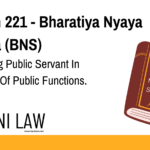Code: Section 217 BNS
Whoever gives to any public servant any information which he knows or
believes to be false, intending thereby to cause, or knowing it to be likely that he will
thereby cause, such public servant—
(a) to do or omit anything which such public servant ought not to do or omit
if the true state of facts respecting which such information is given were known by
him; or
(b) to use the lawful power of such public servant to the injury or annoyance
of any person,
shall be punished with imprisonment of either description for a term which may extend to
one year, or with fine which may extend to ten thousand rupees, or with both.
Illustrations.
(a) A informs a Magistrate that Z, a police officer, subordinate to such Magistrate,
has been guilty of neglect of duty or misconduct, knowing such information to be false,
and knowing it to be likely that the information will cause the Magistrate to dismiss Z. A
has committed the offence defined in this section.
(b) A falsely informs a public servant that Z has contraband salt in a secret place,
knowing such information to be false, and knowing that it is likely that the consequence
of the information will be a search of Z’s premises, attended with annoyance to Z. A has
committed the offence defined in this section.
(c) A falsely informs a policeman that he has been assaulted and robbed in the
neighbourhood of a particular village. He does not mention the name of any person as one
of his assailants, but knows it to be likely that in consequence of this information the
police will make enquiries and institute searches in the village to the annoyance of the
villagers or some of them. A has committed an offence under this section.
Explanation of Section 217 BNS
What Does Section 217 BNS Cover?
Section 217 of the Bharatiya Nyaya Sanhita (BNS) criminalizes the act of giving false information to a public servant when the intention is to cause harm or injury to another person.
Key Elements of the Offense:
- False Information:
- The information provided must be false and knowingly incorrect.
- Given to a Public Servant:
- The false information must be given to an officer with lawful powers (e.g., police, magistrates, revenue officers, etc.).
- Intent to Cause Harm:
- The intent must be to misuse the legal system to harm another person unfairly.
- Punishment:
- Imprisonment: Up to two years.
- Fine: Amount not specified.
- Both: In certain cases, both may apply.
Illustrations of Section 217 BNS
Example 1: False Police Complaint
A person falsely accuses their neighbor of theft in a police complaint to get them arrested. This act is punishable under Section 217 BNS.
Example 2: Fake Land Dispute Allegation
Someone falsely informs the revenue officer that a rival illegally occupied government land, intending to have legal action taken against them.
Example 3: False FIR Against a Business Competitor
A business owner lodges a fake complaint against their competitor, alleging tax fraud, to get them in legal trouble.
Common Questions and Answers on Section 217 BNS
1. Is Section 217 BNS a bailable offense?
Yes, Section 217 BNS is generally a bailable and non-cognizable offense, meaning arrest without a warrant is not allowed.
2. Can a person be punished if they unknowingly provide false information?
No. To be charged under Section 217 BNS, the person must have knowingly and intentionally given false information with an intent to cause harm.
3. Who is considered a “public servant” under this section?
A public servant includes police officers, magistrates, judges, revenue officers, tax officials, and other government authorities with legal powers.
4. What are the legal defenses against charges under Section 217 BNS?
A person may defend themselves by proving:
- They genuinely believed the information was true.
- They had no intention to cause harm to anyone.
5. How is Section 217 BNS different from defamation?
- Section 217 BNS punishes false information given to a public servant with the intent to cause legal harm.
- Defamation (Section 354 BNS) involves making false statements publicly to harm someone’s reputation.
Conclusion
Section 217 of the Bharatiya Nyaya Sanhita (BNS) protects individuals from false complaints and misuse of legal authority. Anyone found guilty of deliberately misleading public servants to cause harm to another person may face serious legal consequences.
For more legal insights, visit ApniLaw today! 🚀








